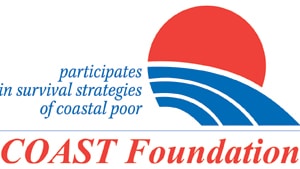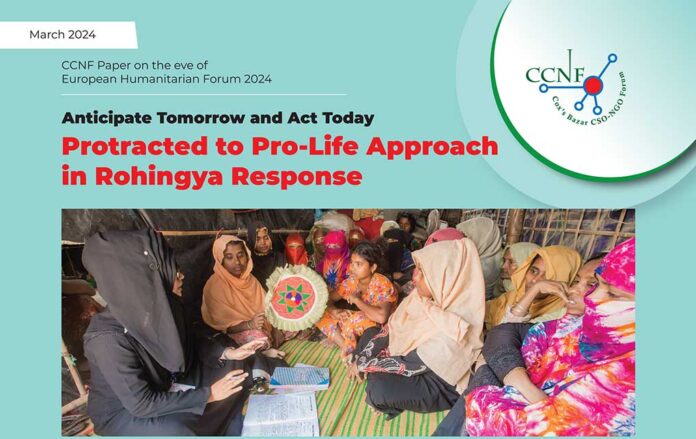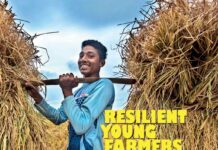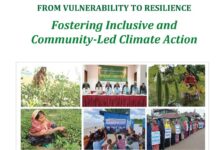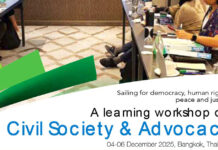CCNF paper on the eve of European Humanitarian Forum 2024
The audience of a discussion on Rohingya Response held in Bangkok in December 2023 was asked if they believe that the dignified repatriation of the Rohingyas from Bangladesh is possible. There was not a single positive response. Around 1.1 million Rohingya refugees have taken shelter in Cox’s Bazar, a tourist city in Bangladesh, since August 2017. The government of Bangladesh initiated a fifty-billion-dollar plan to make Cox’s Bazar a tourist and economic hub. There are threats of Climate Change impacts, i.e., the district and one-third of the country might be inundated by 2050, according to the IPCC (International Panel on Climate Change) forecast. The government of Bangladesh allocated approximately 8000 hectares of forest land for the Rohingya refugees to live in
(around 40 thousand refugees per square km), which has gained lavish green again. In fact, of area. The government of Bangladesh invested around $400 million in developing an island called ‘Bashachar’ as an exclusive habitat for refugees to
create ease in the camps in Cox’s Bazar. Since the beginning of this crisis, i.e., September 2017, Cox’s Bazar CSO NGO Forum (CCNF, www.cxb-no-ngo.org) has been independently and proactively promoting a human and refugee rights responsive Cox’s Bazar society through mobilisation both at local and national level. Primarily, this forum started a campaign for localisation, aid transparency, accountability to the affected population and participation revolution. CCNF organised a public seminar on response strategy on 11th March 2024 in Cox’s Bazar. The summary of the outcome of the seminar is depicted in this paper.
Rohingya refugees should be facilitated with political rights
Around 60% of refugee populations are young and have minimum education. They are conducting large education programs in the camps with the support of others. They need support to develop their own institutions for their political rights, including managing the relief operation. They must be able to mobilise their community within the camps, especially in law-and-order situations. More than 100 international NGOs are working in the Rohingya camps. They have a responsibility to support the Rohingya diaspora to organise their community at the international level for a dignified repatriation. Civil war is ravaging Myanmar, and NUG (National Unity Government) and PDF (People Democratic Force) are gaining momentum and victory against the junta. NUG has officially announced that they will provide the Rohingya with citizenship. The Rohingya community should be aware of this and should be able to make their own decision.
Aid transparency and inclusive participation should be tailored to enhance direct benefits to the refugees
JRP (Joint Response Plan) raised 50-70% of the required funds for the Rohingya response last year, and since 2018, the
average fundraising has only been 65%. CCNF study found that in 2023, around $246 of aid came for each Rohingya family ($51 per person). However, each Rohingya family received materials of $69 ($12 per person), around one-fourth of the aid received. This calculation excludes the expenditure on protection, education, health, staff salary and management costs. In the beginning, every Rohingya refugee individual received food costing $12, which was reduced to $8 last year, and now it is again increased to $10. Given the inflation, we strongly recommend increasing it even at the cost of reducing management and other expenses. There are other funds out of the JRP framework, including IFRC, MSF, and occasional INGO funding for the local NGOs. There are scopes to enhance more direct benefits to refugee families, including (I) reducing management costs, especially of the international agencies, through shifting to Ukhiya closing the Cox’s Bazar offices, technology transfer and recruiting local staff, (ii) considering small INGO and local NGOs as backup partners of JRP process and (iii) regular participation of local government leaders and agencies in response implementation.
A home-grown civil society with a proven track record is indispensable to support refugee rights
Bangladesh is a country of vibrant civil society that works as a right-based agency. There is also the growth of local INGOs that are efficient in-service delivery elsewhere in the world. Some donors and international agencies promote exclusive advocacy groups and platforms, which create disunity and sometimes circus rather than embarking on circumstance.
The right-based independent civil society proposes the following recommendations
(i) platform/ response structure should run with scope for inclusivity of knowledge and locally responsive civil societies rather than creating controversial definitions which result in divisions and conflict among local
leaders, (ii) pooled fund management should create a website in Bangla language and publish how much fund is disbursed to which NGO for monitoring and transparency. (iii) There is a need for an NGO / CSO in Cox’s Bazar with fair and responsive governance.
Download PDF copy click here


